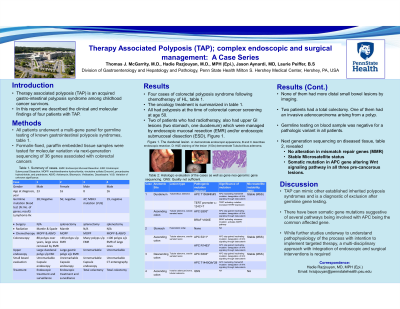Tuesday Poster Session
Category: Colon
P3144 - Therapy Associated Polyposis: A Case Series
Tuesday, October 24, 2023
10:30 AM - 4:00 PM PT
Location: Exhibit Hall

Has Audio
- HR
Hadie Razjouyan, MD, MPH
Penn State University
Hershey, PA
Presenting Author(s)
Award: ACG Case Reports Journal Award
Award: Presidential Poster Award
Hadie Razjouyan, MD, MPH, Thomas McGarrity, MD, Jason Aynardi, MD, Laurie Peiffer,
Penn State University, Hershey, PA
Introduction: Survivors of childhood and young adulthood cancers specifically Hodgkin’s lymphoma (HL) is at increased risk for a variety of cancers years after cancer treatment. Colorectal cancer has been reported up to 8 times higher in this population. Initially reported in 2014, therapy associated polyposis (TAP) is an acquired gastro-intestinal polyposis syndrome among childhood cancer survivors. The clinical management of patients with TAP is challenging in part related to extensive abdominal, pelvic and chest radiotherapy. In this report we described the clinical endoscopic and surgical management of four patients with TAP.
Case Description/Methods: Methods: The patients were referred for colorectal cancer screening or management of documented gastrointestinal polyposis. Clinical and histologic data were obtained. All patients underwent a multi-gene panel for germline testing of known gastrointestinal polyposis syndromes. Formalin-fixed, paraffin embedded tissue samples were retrieved. Molecular testing result via next-generation sequencing of 36 genes associated with colorectal cancers was performed.
Cases:
We report four cases of colorectal polyposis syndrome following chemotherapy of HL. Their oncology treatment is summarized in table 1. They were found to have polyposis at the time of colorectal cancer screening at age 50. Two of patients who had radiotherapy, also had upper GI lesions (two stomach, one duodenum) which were managed by endoscopic mucosal resection technique and/or endoscopic submucosal dissection. None of them had more distal small bowel lesions by imaging. One patient had a total colectomy. Pathology revealed an invasive adenocarcinoma arising from a polyp. Germline testing on blood sample by multigene panel was negative for a pathologic variant in all four patients. Next generation sequencing on diseased tissue revealed no alteration in mismatch repair genes (MMR) with stable Microsatellite status.
Discussion: TAP can mimic other established inherited polyposis syndromes and is a diagnostic of exclusion after germline gene testing. The somatic gene mutation panel yet to be explored. While further studies underway to understand pathophysiology of the process with intention to implement targeted therapy, a multi-disciplinary approach with integration of endoscopic and surgical interventions is required.
Disclosures:
Hadie Razjouyan, MD, MPH, Thomas McGarrity, MD, Jason Aynardi, MD, Laurie Peiffer, . P3144 - Therapy Associated Polyposis: A Case Series, ACG 2023 Annual Scientific Meeting Abstracts. Vancouver, BC, Canada: American College of Gastroenterology.
Award: Presidential Poster Award
Hadie Razjouyan, MD, MPH, Thomas McGarrity, MD, Jason Aynardi, MD, Laurie Peiffer,
Penn State University, Hershey, PA
Introduction: Survivors of childhood and young adulthood cancers specifically Hodgkin’s lymphoma (HL) is at increased risk for a variety of cancers years after cancer treatment. Colorectal cancer has been reported up to 8 times higher in this population. Initially reported in 2014, therapy associated polyposis (TAP) is an acquired gastro-intestinal polyposis syndrome among childhood cancer survivors. The clinical management of patients with TAP is challenging in part related to extensive abdominal, pelvic and chest radiotherapy. In this report we described the clinical endoscopic and surgical management of four patients with TAP.
Case Description/Methods: Methods: The patients were referred for colorectal cancer screening or management of documented gastrointestinal polyposis. Clinical and histologic data were obtained. All patients underwent a multi-gene panel for germline testing of known gastrointestinal polyposis syndromes. Formalin-fixed, paraffin embedded tissue samples were retrieved. Molecular testing result via next-generation sequencing of 36 genes associated with colorectal cancers was performed.
Cases:
We report four cases of colorectal polyposis syndrome following chemotherapy of HL. Their oncology treatment is summarized in table 1. They were found to have polyposis at the time of colorectal cancer screening at age 50. Two of patients who had radiotherapy, also had upper GI lesions (two stomach, one duodenum) which were managed by endoscopic mucosal resection technique and/or endoscopic submucosal dissection. None of them had more distal small bowel lesions by imaging. One patient had a total colectomy. Pathology revealed an invasive adenocarcinoma arising from a polyp. Germline testing on blood sample by multigene panel was negative for a pathologic variant in all four patients. Next generation sequencing on diseased tissue revealed no alteration in mismatch repair genes (MMR) with stable Microsatellite status.
Discussion: TAP can mimic other established inherited polyposis syndromes and is a diagnostic of exclusion after germline gene testing. The somatic gene mutation panel yet to be explored. While further studies underway to understand pathophysiology of the process with intention to implement targeted therapy, a multi-disciplinary approach with integration of endoscopic and surgical interventions is required.
Disclosures:
Hadie Razjouyan indicated no relevant financial relationships.
Thomas McGarrity indicated no relevant financial relationships.
Jason Aynardi indicated no relevant financial relationships.
Laurie Peiffer indicated no relevant financial relationships.
Hadie Razjouyan, MD, MPH, Thomas McGarrity, MD, Jason Aynardi, MD, Laurie Peiffer, . P3144 - Therapy Associated Polyposis: A Case Series, ACG 2023 Annual Scientific Meeting Abstracts. Vancouver, BC, Canada: American College of Gastroenterology.

